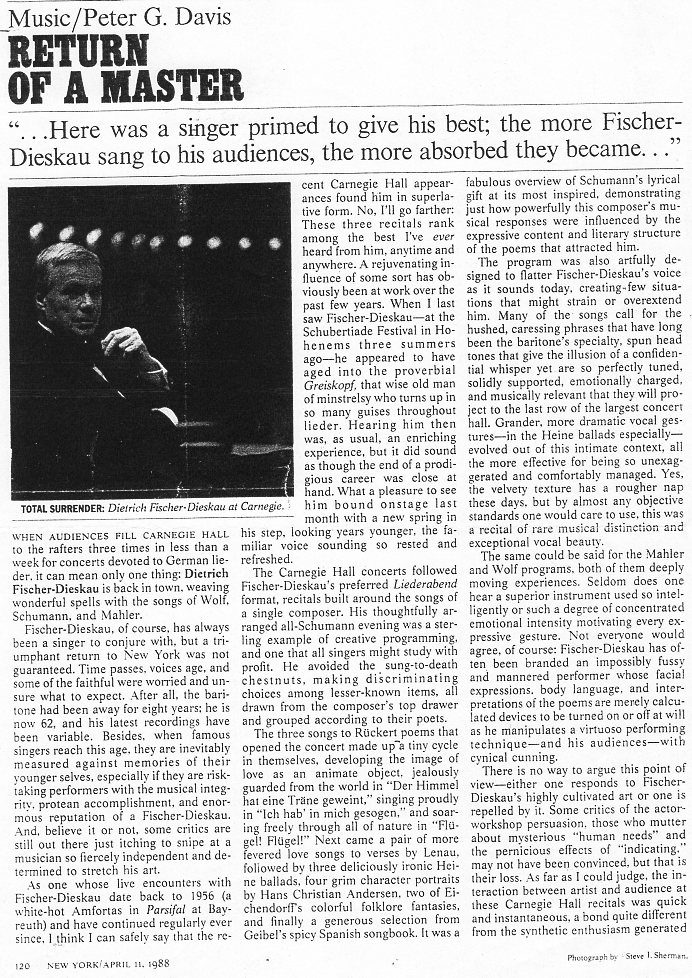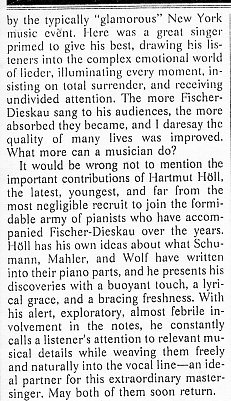
Zum Liederabend am 22. März 1988 in New York
The New York Times, 24. März 1988
Late
City Final Edition
Fischer-Dieskau: The Return of a Meistersinger
Dietrich Fischer-Dieskau probably did not come out of the egg singing ''Die Schone Mullerin'' or ''Dichterliebe,'' but hardly a man alive remembers when the German baritone was anything less than a fully formed master of the song literature. His career, now 40 years along, has defied tradition in rejecting the stereotype of the lieder artist as a great singer in decline. From the beginning, much of Mr. Fischer-Dieskau's success was based on the twin pillars of superior voice and overwhelming intelligence. It was never necessary, as in many song recitals, for the listener's ear to take on faith what the singer's instrument was unable to demonstrate. No wonder, then, that the all-Schumann recital he gave at Carnegie Hall on Tuesday evening began with a prolonged ovation of welcome and proceeded in an atmosphere of hushed respect. The recitalist was indeed a magisterial figure: tall, slim, gray-haired and handsomer than ever. Reverence hung in the air. The devout effect was inadvertently heightened when the audience misunderstood a program injunction against applauding between the songs in each group (meaning a series of pieces with texts by the same poet). So, except for a smattering of clapping at one point that Mr. Fischer-Dieskau wisely cut off with a gesture, silence reigned. If this deprived him of the usual pauses for breath and, as importantly, time to find a mood to suit the various poets, it did have the merit of concentrating attention on the singer's tactics in dealing with Schumann's slightly off-center, hyper-Romantic ardor.
Not surprisingly, at age 62, Mr. Fischer-Dieskau has entered a stage of his career in which the listener's faith in his vocal intentions becomes increasingly a factor. However, most Schumann songs depend less on beautiful tone than on a sensitive reading of the words, and in that area Mr. Fischer-Dieskau still has few serious challengers. In a somber song such as ''Der Einsiedler,'' he wrapped himself so completely in the text that he seemed to be possessed by the music as much as in possession of it. His control over mood did not always survive an unpleasant hardness of tone that appeared in the forte climaxes of martial pieces such as 'Es leuchtet meine Liebe,'' ''Der Soldat'' or ''Die beiden Grenadiere.'' It was a tribute to Mr. Fischer-Dieskau's musical honesty that he attacked such passages at full voice, putting meaning first and letting the vocal cords contribute what they could to the dramatic effect. Many a singer might evoke the flushed, drunken gaiety of ''Belsatzar,'' but only a Fischer-Dieskau can chill the blood with the closing couplet's deadly finality.
Here and there, a song tested the recitalist's resources too heavily. The strenuous complaints of ''Melancholie'' testified to the singer's pain no less than to that of the tortured lover. Mr. Fischer-Dieskau has always known how to unlock the heavy-lidded drama of such Biedermeier pieces. One could admire his unashamed commitment to the faded poetry of ''Der Spielmann,'' for instance, while wishing that the emotional impact of the smashed violin were not diluted by a distressingly bleak tone. Hartmut Holl played that song's elegiac postlude with a poised competence that typified his piano accompaniments all evening.
Perhaps surprisingly, it was Mr. Fischer-Dieskau's treatment of gentler, more lyrical songs that gave the most unalloyed pleasure: the melting sweetness of ''Marzveilchen,'' the deceptive gentleness of ''Muttertraum,'' the nostalgia of ''Zigeunerliedchen.'' And, for a humorous finale, a precisely articulated gallop through ''Der Contrabandiste,'' seemingly sung in a single breath. Was it? No, but Mr. Fischer-Dieskau is above all an illusionist, as are all singers worth listening to.
THE PROGRAM - DIETRICH FISCHER-DIESKAU, baritone. Hartmut Holl, pianist. At Carnegie Hall. All-Schumann Program: ''Der Himmel hat eine Trane geweint'' (Ruckert); ''Ich hab' in mich gesogen'' (Ruckert); ''Flugel! Flugel!'' (Ruckert); ''Meine Rose'' (Lenau); ''Der schwere Abend'' (Lenau); ''Belsatzar'' (Heine); ''Es leuchtet meine Liebe'' (Heine); ''Die beiden Grenadiere'' (Heine); ''Marzveilchen'' (Andersen); ''Muttertraum'' (Andersen); ''Der Soldat'' (Andersen); ''Der Spielmann'' (Andersen); ''Der Einsiedler'' (von Eichendorff); ''Der Schatzgraber'' (von Eichendorff); ''Melancholie'' (Geibel); ''Sehnsucht'' (Geibel); ''Zigeunerliedchen'' 1 and 2 (Geibel); ''Der Contrabandiste'' (Geibel).
DONAL HENAHAN

